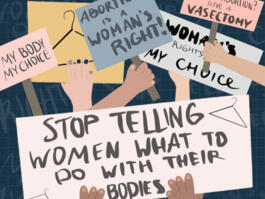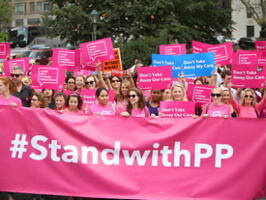Fight Over Texas Abortion Law Divides Voters
Voters are deeply divided over the Texas abortion law that recently went into effect after the Supreme Court last week refused to grant an injunction against it.

Voters are deeply divided over the Texas abortion law that recently went into effect after the Supreme Court last week refused to grant an injunction against it.

Most voters continue to have a positive opinion of Planned Parenthood, but they’re less emphatic when it comes to a new government policy that withholds millions in federal funding from the group.

New York state has just adopted a law that will allow abortions in the final three months of a pregnancy, but even voters who consider themselves pro-choice aren’t eager to see a similar law in their state.

Just after the 46th anniversary of the landmark abortion case Roe v. Wade, most voters are pro-choice and think the ruling is likely to stick for years to come.

Voters still view Planned Parenthood favorably and aren’t overly supportive of the Trump administration’s new ban on taxpayer funding of abortion.

Voters still tend to support the use of tissue from aborted babies for medical purposes but agree with the government’s decision to look into how Planned Parenthood is handling this tissue.

Lawmakers in Hawaii are considering a bill that would require all pregnancy centers to refer patients to facilities that provide abortions, a move pro-lifers say violates their religious beliefs and free speech rights. While most voters are pro-choice, few favor a law like the one in Hawaii.

As the Roman Catholic Church softens its stance on women who receive abortions, most U.S. voters remain pro-choice on the issue but half still see abortions as morally wrong in most cases.

Presidential front-runners Donald Trump and Hillary Clinton have both had to do damage control recently following comments they made about abortion. Voters place more importance than ever on the issue, and most remain pro-choice.

A recently released video showing a Planned Parenthood official discussing the harvesting and sale of body organs from aborted babies to medical laboratories has kicked up a political storm. Most voters still approve of the pro-choice group but don’t care much for its sales practices.

The gap between pro-choice and pro-life voters has narrowed from recent surveys, and belief that getting an abortion in this country is too easy is stronger than it has been in over a year.
A new Rasmussen Reports national telephone survey finds that 50% of Likely U.S. Voters now consider themselves pro-choice, while 41% say they are pro-life. (To see survey question wording, click here.)
(Want a free daily e-mail update? If it's in the news, it's in our polls). Rasmussen Reports updates are also available on Twitter or Facebook.
The survey of 1,000 Likely Voters was conducted on April 5-6, 2015 by Rasmussen Reports. The margin of sampling error is +/- 3 percentage points with a 95% level of confidence. Field work for all Rasmussen Reports surveys is conducted by Pulse Opinion Research, LLC. See methodology.
[Have we heard from you yet? The 2015 Rasmussen Reports reader survey is the most important poll we’ll take all year. Take the survey now.]

Most voters remain pro-choice when it comes to abortion, and fewer now think there should be a waiting period before allowing the procedure. But voters also don't attach as much importance to the abortion issue when they go to the polls.
A new Rasmussen Reports national telephone survey finds that 55% of Likely U.S. Voters consider themselves pro-choice, while 36% say they are pro-life. (To see survey question wording, click here.)
(Want a free daily e-mail update? If it's in the news, it's in our polls). Rasmussen Reports updates are also available on Twitter or Facebook.
The survey of 800 Likely Voters was conducted on January 2, 2015 by Rasmussen Reports. The margin of sampling error is +/- 3.5 percentage points with a 95% level of confidence. Field work for all Rasmussen Reports surveys is conducted by Pulse Opinion Research, LLC. See methodology.

When it comes to the issue of abortion, the number of voters who consider themselves pro-life is at an all-time high.
A new Rasmussen Reports national telephone survey finds that 48% of Likely U.S. Voters now consider themselves pro-choice, while 44% are pro-life. (To see survey question wording, click here.)
(Want a free daily e-mail update? If it's in the news, it's in our polls). Rasmussen Reports updates are also available on Twitter or Facebook.
The survey of 1,000 Likely Voters was conducted on June 30 – July 1, 2014 by Rasmussen Reports. The margin of sampling error is +/- 3 percentage points with a 95% level of confidence. Field work for all Rasmussen Reports surveys is conducted by Pulse Opinion Research, LLC. See methodology.

Voters for the first time are evenly divided over whether there should be a waiting period before a woman can get an abortion, but the importance of abortion as a voting issue has fallen to its lowest level in a year-and-a-half.
A new Rasmussen Reports national telephone survey finds that 43% of Likely U.S. Voters continue to favor a waiting period before an abortion, but that's down from 47% in July and an all-time high of 56% in February, 2011. Forty-three percent (43%) now also oppose a waiting period requirement, a six-point jump from July and a new high. Fourteen percent (14%) are not sure. (To see survey question wording, click here.)
Special offer: A Rasmussen Reader subscription that lasts through December 31, 2014 is now just $24.95. Sign up today!
(Want a free daily e-mail update? If it's in the news, it's in our polls). Rasmussen Reports updates are also available on Twitter or Facebook.
The survey of 1,000 Likely Voters was conducted on October 6-7, 2013 by Rasmussen Reports. The margin of sampling error is +/- 3 percentage points with a 95% level of confidence. Field work for all Rasmussen Reports surveys is conducted by Pulse Opinion Research, LLC. See methodology.

Several states including Texas and Wisconsin are advancing new restrictive abortion laws that would, among other things, ban abortions after 20 weeks and require doctors that perform abortions to have admitting privileges at nearby hospitals. Voters nationwide are almost evenly divided on the 20-week ban but are more supportive of additional doctor requirements.
The latest Rasmussen Reports national telephone survey shows that 44% of Likely U.S. Voters favor a ban on abortion after 20 weeks. Forty-one percent (41%) oppose such a ban. Another 15% are undecided. (To see survey question wording, click here.)
How did you do in this week’s Rasmussen Challenge? Check the leaderboard.
The survey of 1,000 Likely Voters was conducted on July 16-17, 2013 by Rasmussen Reports. The margin of sampling error is +/- 3 percentage points with a 95% level of confidence. Field work for all Rasmussen Reports surveys is conducted by Pulse Opinion Research, LLC. See methodology.

With Texas and Wisconsin the latest states to attempt limits on abortion, fewer voters than ever are calling themselves pro-choice, and the gap between pro-choice and pro-life voters is the narrowest yet.
A new Rasmussen Reports national telephone survey finds that 46% of Likely U.S. Voters now consider themselves pro-choice, the lowest finding in three years of regular surveying. Forty-three percent (43%) say they are pro-life, matching the highest finding to date. Eleven percent (11%) are undecided. (To see survey question wording, click here.)
Win an iPad: Play the Rasmussen Challenge!
(Want a free daily e-mail update? If it's in the news, it's in our polls). Rasmussen Reports updates are also available on Twitter or Facebook.
The survey of 1,000 Likely Voters was conducted on July 5, 2013 by Rasmussen Reports. The margin of sampling error is +/- 3 percentage points with a 95% level of confidence. Field work for all Rasmussen Reports surveys is conducted by Pulse Opinion Research, LLC. See methodology.

North Dakota recently enacted the most restrictive anti-abortion law in the nation, and several other states are considering similar legislation. While the number of pro-choice voters remains near an all-time high, more voters than ever already think it is too hard to get an abortion in this country, but even more still think it's too easy to get one.
A new Rasmussen Reports national telephone survey finds that 53% of Likely U.S. Voters consider themselves pro-choice when it comes to the issue of abortion, just below the record high of 54% reached in November. Forty percent (40%) say they are pro-life, up from January’s low of 36%. (To see survey question wording, click here.)
How did you do in this week’s Rasmussen Challenge? Check the leader board.
(Want a free daily e-mail update? If it's in the news, it's in our polls). Rasmussen Reports updates are also available on Twitter or Facebook.
The survey of 1,000 Likely Voters was conducted on April 9-10, 2013 by Rasmussen Reports. The margin of sampling error is +/- 3 percentage points with a 95% level of confidence. Field work for all Rasmussen Reports surveys is conducted by Pulse Opinion Research, LLC. See methodology.

Forty years after the landmark Roe vs. Wade case legalizing abortion in the United States, fewer voters than ever consider themselves pro-life, while those who say they are pro-choice remains at an all-time high.

More voters than ever now identify themselves as pro-choice when it comes to abortion, and most rate the issue as important to how they vote.
The latest Rasmussen Reports national telephone survey of Likely U.S. Voters shows that 54% describe themselves as pro-choice on the issue of abortion, while 38% say they are pro-life. (To see survey question wording, click here.)
Win an IPad: Take the Rasmussen Challenge.
(Want a free daily e-mail update? If it's in the news, it's in our polls). Rasmussen Reports updates are also available on Twitter or Facebook.
This survey of 1,000 Likely Voters was conducted on November 10-11, 2012 by Rasmussen Reports. The margin of sampling error is +/- 3 percentage points with a 95% level of confidence. Field work for all Rasmussen Reports surveys is conducted by Pulse Opinion Research, LLC. See methodology.

More voters than ever are now pro-choice when it comes to abortion, but just as many view it as morally wrong in most situations.
Overall, 52% of Likely U.S. Voters consider themselves pro-choice when it comes to abortion, according to the latest Rasmussen Reports national telephone survey. Forty-one percent (41%) say they are pro-life. (To see survey question wording, click here.)
The survey of 1,000 Likely Voters was conducted on July 31-August 1, 2012 by Rasmussen Reports. The margin of sampling error is +/- 3 percentage points with a 95% level of confidence. Field work for all Rasmussen Reports surveys is conducted by Pulse Opinion Research, LLC . See methodology.